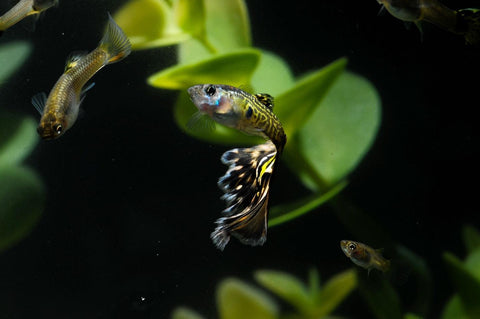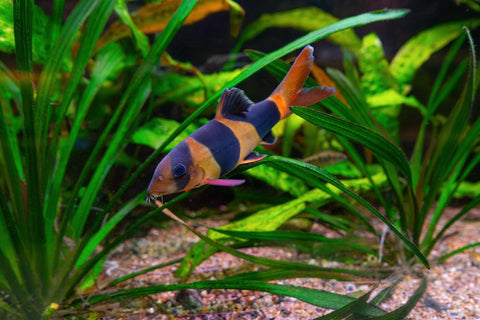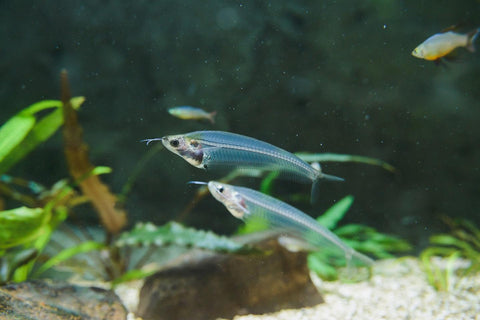Poecilia reticulata, commonly known as the guppy, is one of the most popular and widespread freshwater fish species for aquariums. Originally from the waters of South America, the guppy is known for its vibrant colors and interesting reproductive behavior.
Appearance and characteristics
The guppy is a small fish with an average size of around 5 cm. The males are usually more colorful and eye-catching than the females. They have a variety of colors and patterns, including bright shades of blue, green, yellow and orange. The females are rather inconspicuous and have a light grey to olive green coloration.
A characteristic feature of the guppy is the long, fan-shaped tail fin of the males, which is often referred to as the 'fan tail'. This tail fin can have different patterns and colors and serves to attract the attention of females during the mating season.
Habitat and behavior
In the wild, the guppy can be found in various freshwater bodies of water in South America, including rivers, ponds and lakes. They prefer waters with plenty of vegetation, as this offers them protection from predators.
Guppies are relatively easy to keep in aquariums and are well suited to beginners. They are lively and playful and can be kept in community aquariums with other peaceful species. Guppies are also known for their interesting reproductive behavior. Males try to impress the females during the mating ritual by presenting their colorful tail fins and flaunting themselves in front of them.
Guppies are social and like to live in groups. They are peaceful fish and tend to avoid conflict. However, males can be territorial and fights can occur if they are kept in aquariums that are too small or overcrowded. It is important to provide enough space and hiding places for the fish to ensure their well-being.
Care and nutrition
Keeping guppies requires a well-maintained aquarium with sufficient space and stable water quality. They prefer a water temperature between 24°C and 28°C and a slightly alkaline pH value of 7 to 8. Guppies are adaptable and can live in different water hardness ranges as long as the water is clean and well aerated.
In terms of diet, guppies are omnivores. In the wild, they feed on various insect larvae, algae and other small organisms. In captivity, they can be fed with commercially available fish food that contains a balanced mixture of plant and animal components. It is advisable to vary the food and occasionally offer live or frozen food such as daphnia or mosquito larvae to promote the health and vitality of the guppies.
Breeding and reproduction
Reproduction of guppies is relatively easy and they are known for their fast reproductive speed. Females give birth to live fry instead of laying eggs. A single female can produce several hundred fry per year.
It is important that breeders have sufficient space and resources to house and raise the fry. Guppies are known for cannibalism, and the males can attack the young. It is therefore advisable to use a separate rearing box or container to protect the fry from the adult fish.
Selective breeding has resulted in a wide variety of guppy variations, including different colors, patterns and fin shapes. Breeders have the opportunity to enhance certain traits and breed guppies with unique appearances.
Health care
To ensure the health and well-being of your guppies, it is important to regularly test the water in the aquarium and ensure that the water values are within the optimum range. Excessive pollution and poor water quality can lead to disease and stress
Guppies are susceptible to various diseases, including fin rot, ichthyophthirius (white spot disease) and dropsy. If there are signs of illness such as changes in behavior, loss of color, changes in fins or abnormal swimming behavior, it is important to act immediately. Treatment of disease often requires the use of medication and adjustment of water parameters.
It is also advisable to carry out regular water changes to control the growth of algae and bacteria and maintain the water quality. A balanced diet, clean water and a stress-free environment are key to promoting the health and longevity of guppies.
The most important facts about the Poecilia reticulata
The guppy is a fascinating and colorful freshwater fish that is suitable for both beginners and experienced aquarists. With their lively behavior, interesting reproductive behavior and variety of colors and patterns, guppies provide an entertaining and varied aquarium experience. With the right care, attention and a healthy environment, guppies can provide many years of enjoyment.




Comments (0)
There are no comments for this article. Be the first one to leave a message!